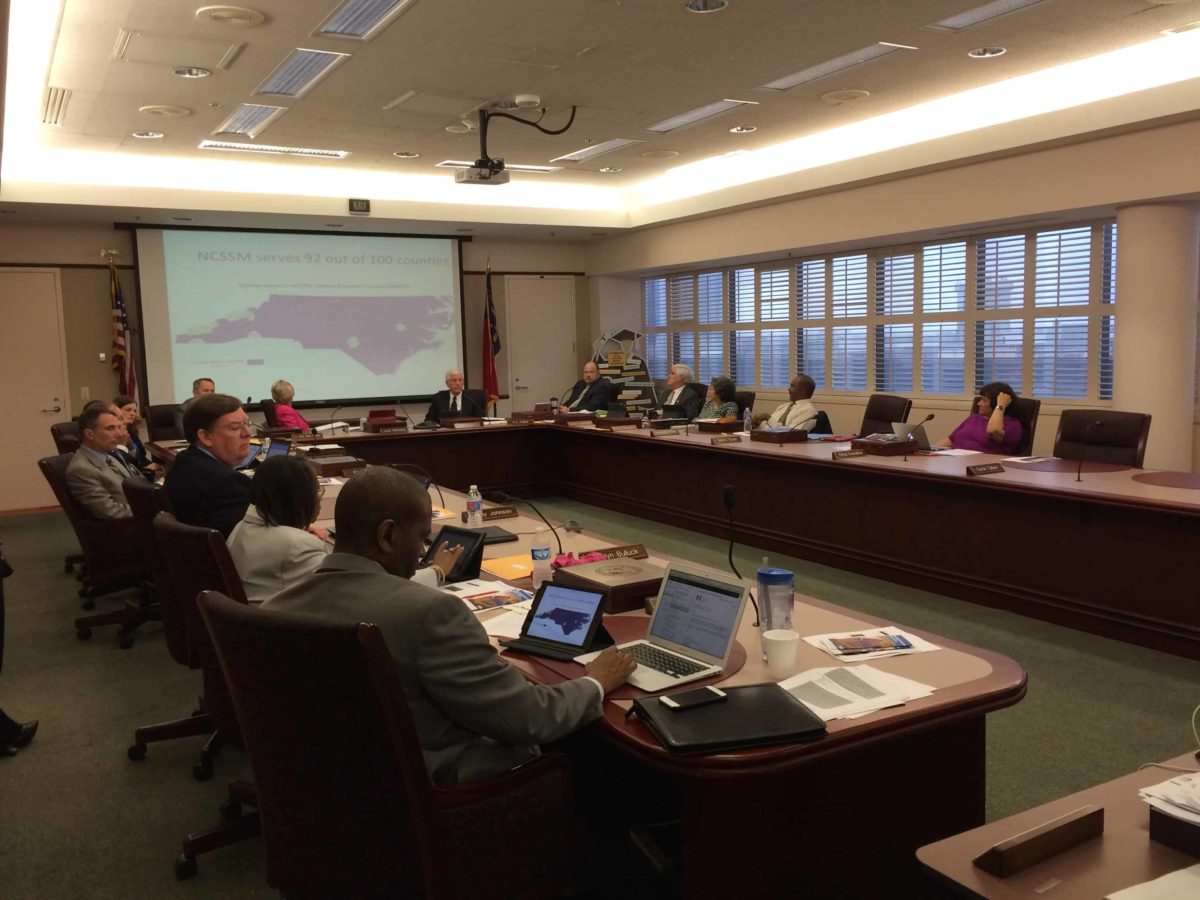
Last week I wrote about Berger v. McCrory and the oral arguments before the North Carolina Supreme Court – a step in the process toward a landmark ruling on the interpretation of constitutional requirements for separation of powers and the role of the General Assembly and the Governor in appointments. The day before these arguments, another case was put into motion with arguments at the trial court level on whether the General Assembly can mandate that the State Board of Education’s rules are subject to approval by a state agency, the Rules Review Commission. Berger v. McCrory raises questions about whether or when commissions comprised of legislative appointments, like the Rules Review Commission, violate separation of powers. State Board v. State raises questions about whether the State Board is a mere part of the Executive Agency subject to the same rules or whether its constitutional powers set it apart as almost a fourth branch of government.
Lots of questions. Lots of unsettled authority to govern.
At issue in State Board v. State is the State Board’s constitutional rule-making authority. The North Carolina Constitution provides that the State Board shall “supervise and administer the free public school system” and “make all needed rules and regulations in relation thereto.” This power is limited, however, by the caveat that the State Board is “subject to laws enacted by the General Assembly.”1 The State Board argues that this means the General Assembly can pass laws on education issues that limit the State Board’s authority on those issues or even reverse course on an issue the State Board has addressed. The State Board argues further that the General Assembly cannot delegate rule review to an executive agency that makes determinations independent of the General Assembly on the appropriateness of the State Board’s rules. In its memorandum in support of its motion, the State Board argues: “The RRC [Rules Review Commission] is a separate administrative agency that is neither representative of the people of North Carolina nor accountable to them.”
The State Board complains that the practical effect of being subject to the Rules Review Commission is that it impedes the State Board’s ability to provide timely policy on critical education issues because the rules review process takes six months or more. It further notes that without any expertise on education issues, the RRC has uniformly objected to or modified every rule submitted by the Board.2 Since May of 2014, the State Board has refused to submit its rules to the RRC and takes the position that its policies are binding once approved by the State Board.
While the State Board has existed as a constitutional body since 1868, the Rules Review Commission has only existed with this kind of power since 1985. In 1977, the General Assembly created the “Administrative Rules Review Committee.” It served in an advisory capacity to the General Assembly for the purpose of identifying rules that should be corrected through legislation. In 1985, the General Assembly created a new RRC with authority to essentially veto rules from state agencies.3 The RRC consists of ten commission members appointed by the General Assembly, five by the Senate Pro Tempore and five by the House Speaker.4 The State, in its brief, describes it as an executive branch agency of the State.5
In Berger v. McCrory, attorneys for the Governors argued that any appointment by the General Assembly of an individual that serves on a commission housed in an executive branch is a constitutional violation of separation of powers. Mr. Webster, attorney for the Governors argued, “if the principal thrust is to carry out the laws, the executive branch is the only one to make the appointments.” There are legitimate questions of whether the RRC acts as an executive or legislative body and whether the Governor rather than the General Assembly should be vested in the power to appoint these positions.6 The argument is framed differently here: the State Board argues that the General Assembly can’t make the State Board’s rules subject to an executive branch agency – that it is only subject to laws enacted by the General Assembly.
The State counters that being “subject to laws enacted by the General Assembly” includes laws providing for the Rules Review Commission. The State argues that “the predicate question before this Court is whether the Board is an executive branch agency that is subject to the terms of the APA [Administrative Procedures Act].7 It further argues a that “[a] modern legislature must be able to delegate – in proper instances – a ‘limited portion of its legislative powers’ to administrative bodies which are equipped to adapt legislation ‘to complex conditions involving numerous details with which the Legislature cannot deal directly.’”8
These issues have been presented to Judge Paul Gessner. It is unclear whether any of these issues may be referred to a three-judge panel for review of facial constitutional challenges, as was the case with McCrory v. Berger.
What is clear is that there is much sorting out to do on the powers of the State Board, the Governor, and the General Assembly.
And hanging in the balance is the constitutional right of all children to an equal opportunity to a sound basic education and the duty of the “State” to guard and maintain that right.
On April 24, Judge Howard E. Manning, Jr. issued an order in the ongoing Leandro v. State litigation for a hearing to be held July 21 to July 23 to review “a definite plan of action from the State of North Carolina as to how the State of North Carolina intends to correct the educational deficiencies in the student population…” Presumably, the “State” includes the Governor and the General Assembly, along with the separately named defendant, the State Board of Education. So while these two cases on power work their way through the judicial system, Judge Manning will have the opportunity to look at how the constitutional entities of the Office of the Governor, the State Board of Education and the General Assembly work together to meet the constitutional obligations of the State. And that’s at least as important.
Recommended reading



